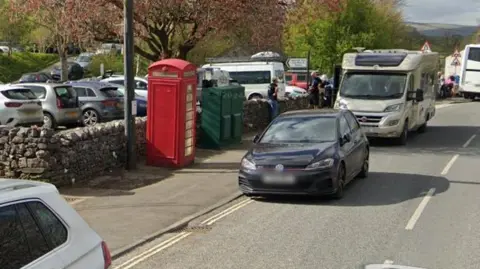Dozens of 999 calls made from at-risk phone boxes
 Google
GoogleDozens of emergency phone calls were made from phone boxes in North Yorkshire which BT has earmarked for closure, the council has said.
The communications company has given notice of its intention to withdraw more than 90 kiosks in the county classed as "last at site", meaning there are no other payphones within 400m.
In response to a 90-day consultation for more than 40 sites, North Yorkshire Council said there was evidence to retain them, as they had been used to make 68 calls to police over 12 months.
BT, which has been contacted for comment, put forward the proposals as part of an ongoing rationalisation of underused phone boxes.
North Yorkshire Council raised concerns about visitors' ability to contact emergency services in remote and rural parts of the county popular with tourists.
"Unfortunately, incidents and accidents needing emergency or helpline advice will happen," it said.
"The local community will be aware which mobile service providers have a better-quality signal for their settlement and will purchase mobile service provider contracts appropriately.
"Visitors to the region may not be aware of weaker signal areas for different service providers, so if an incident arises that does need emergency or helpline advice, they may not be able to use their own mobile phone."
Figures provided to the council by North Yorkshire Police showed one phone box in Bondgate, Selby, was used to call police 12 times.
Kiosks in Hunmanby, near Filey, and Embsay, in the Yorkshire Dales, were used nine times.
Sites in Sandsend, near Whitby, Horton-in-Ribblesdale, and Weaverthorpe, near Malton, were all used "multiple times", according to the Local Democracy Reporting Service.
A separate consultation for 32 other sites will take place later this year.
"We've made representations to BT, but the problem is they look at how many calls have been made, and the numbers are often very low," Upper Dales councillor Yvonne Peacock said.
She said while mobile phone coverage had improved in recent years, a payphone was sometimes the only option for tourists to contact the emergency services.
BT can only remove "last at site" kiosks if certain criteria are met, such as the area not having a high accident or suicide rate, and having mobile phone coverage for all four networks.
The final decision on the removal rests with the company.
Listen to highlights from North Yorkshire on BBC Sounds, catch up with the latest episode of Look North.
